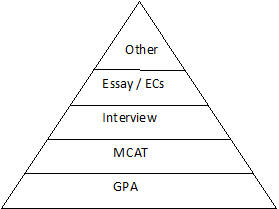Medaholic.com – Why Grades Matter
Categories: Med Admissions, Undergrad

The following is a guest post from my good friend over at Medaholic.com. He is currently a first year medical student and is involved in his school’s admissions process. His blog is fantastic, so check it out!
Why do grades matter so much when it comes to getting into medical school? We’ve all seen people obsessed with getting a good GPA, arguing with professors for extra an extra mark here and there, and studying not to learn, but as a means to a better grade. The hard fact is if you want to get into medical school, you need solid academic performance. As a result, many students become mark-mongering paranoid GPA calculators.
But we all know that a high GPA does not necessarily correlate with being a good physician. Intangible factors like compassion, empathy and bedside manner cannot be recorded on a transcript. So why should grades play such an important role, if not the most essential, when it comes to medical school admissions?
There are three reasons why medical schools, and why you too, should put such a big emphasis on grades. (1) Convenience, (2) Objectivity, (3) Indication of future performance
Convenience
Every year, tens of thousands of applications are submitted to medical schools around the country. Each package contains a wealth of information: personal information, a transcript, MCAT score, personal essay, list of extracurricular activities, references and supplementary documents. In order to be fair and thorough, each application is carefully evaluated and reviewed. As a result, the process is time consuming.
In order to streamline the admissions process, each application is broken into its individual parts and evaluated apart from each other. Your grades and MCAT would be evaluated by a computer, your essay read by an adcom who has not seen your grades, your reference letter by another adcom, etc.
Unfortunately, the fastest way to screen out applicants and reduce the workload is by cold hard numbers. That is why your GPA is the first step of the entire process. If you do not have a good GPA, the rest of your application is irrelevant because it may not even be looked at or if so, you are already disadvantaged. A good GPA gets your foot in the door and gets the rest of your application to be considered seriously.
I find it uncomfortable to know that we can judge and “know” a person’s capabilities through a single number. But regrettably, this is the way things are currently done and without screening out applicants, the admissions process would be horribly ineffective.
Objectivity
Another problem, we adcoms face is how to accurately compare students with diverse backgrounds and from different schools. How can you compare the value of a Bachelor in Arts with one from Engineering? It’s comparing apples to oranges.
Grades solve this performance because it evaluates you on your performance in your field of study. Although we may not know if a top student in history would perform just as well in biochemistry, we know at least that he was the best of his peer group. Anything that helps quantitatively assess your achievement makes the admissions process easier.
Now many of you may know that some programs are inherently harder to get good grades in. Furthermore, some universities are more relaxed with giving out grades. How can that be objective? And that is one of the problems we face, and that is why I am a strong proponent of the MCAT, a standardized measure of all applicants. But your grades will still reveal to us your class ranking and how well you did comparatively to students in your program. You cannot fake and present a false a mark like you can with your extracurriculars. Transcripts are the gold standard and that’s why there is such an importance to them.
Furthermore, your grades are one of the few factors that you do have control over and that you can improve in if you put in the effort. Your referee may write you a bad letter, you might not be able to land a research position, you might get a terrible interviewer, but your grades are something you can control. In fact, I would go to say that grades are not so much a reflection of a student’s mental abilities as it is of their work ethic and enthusiasm. It is an area where there are few excuses.
Indication of future performance
Studies have shown that the best indicator and correlation of medical school performance has been undergraduate grades. Students who have performed well before medical school tend to continue doing so in medical school and have a high success rate of graduating. Because of the enormous resources and time invested in medical students, all med schools want to avoid drop outs.
Furthermore, a consistently strong GPA demonstrates dedication and hard work over a long period of time. Whereas the MCAT is a single day event that may indicate your intelligence, even the smartest of students will find it difficult to obtain good grades without committed effort constantly. Adcoms will always choose a committed and determined student with good work ethics over a bright but lazy student.
Why this matters to you
If you are considering a career in medicine, good grades are of absolute importance to you. They are the single most vital part of your application. They will increase your chances of acceptance the most, more than any job position, volunteering, or scholarship. Even if you are a Rhodes scholar, if you have dismal grades, it will be extremely difficult for you to be accepted – although the scenario of a Rhodes scholar with poor academic performance is certainly unlikely.
However, I would like to end with a different message and that is grades shouldn’t be your first priority. A better title to this post should have been “Why Grades Matter First to Medical School Admissions.” The GPA is the crucial part to getting you into medical school, but I encourage you to not make it the most important part of your life. Understand its important and leave it at that. There are more important things in life than getting into medical school and being a doctor. Family, faith, service, community, helping others, improving yourself, learning, pursuing your passions. If you can understand the context of grades and set apart appropriate but enough time for it, you will be a much better person and candidate in the end.

I’ve attached a diagram for you. Think of your GPA and MCAT as the foundation to your application. You cannot create a solid application without an adequate base. Each layer at the bottom supports the areas above it. Work on building a solid foundation and after you have that down, then work on the other aspects that will put your application on top.
Trackbacks/Pingbacks
[…] just read an article about the importance of maintaining the highest GPA possible as a pre-medical student. In summary, […]